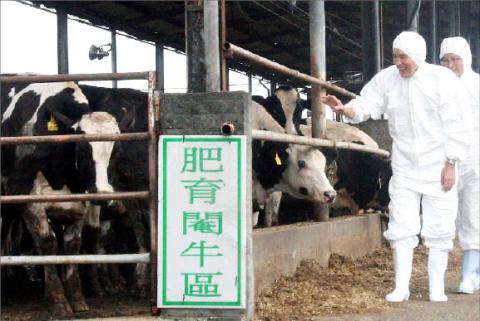The Chinese Nationalist Party (KMT) yesterday dismissed allegations of difficulties in its election campaign in southern cities and counties, but said the party would continue to focus on its campaign efforts in central and southern Taiwan.
The south, including Greater Tainan and Greater Kaohsiung, have traditionally been strongholds for the pan-green camp. President Ma Ying-jeou (馬英九), who is seeking re-election, is setting up his first southern campaign office in Greater Tainan to expand his support base in the south.
Leading the election campaign in Greater Tainan, local KMT heavyweight Huang Cheng-hsiung (黃正雄) said yesterday that grassroots supporters in the city were joining efforts to campaign for Ma and that the party would arrange for Ma and his running mate, Premier Wu Den-yih (吳敦義), to make frequent visits to Greater Tainan and other parts of southern Taiwan.

Photo: CNA
Huang dismissed a report that quoted him as saying that the KMT was facing difficulties in the south and that local factions were reluctant to offer assistance in the presidential election campaign. He said party members in the south would work hard to attract more support for the KMT in the presidential and legislative elections.
“President Ma is putting a great deal of effort into southern Taiwan. Campaigning in Greater Tainan is not easy because of the merger of Tainan County and Tainan City, but we are still hoping that we can have a small lead over the Democratic Progressive Party [DPP] in the city,” he said yesterday at the KMT headquarters.
In an interview with the Chinese-language China Times published yesterday, Huang was quoted as saying that local factions in Greater Tainan were reluctant to join the election campaign and that it would be difficult for Ma to repeat his victory in the city in the 2008 presidential election, in which he received 6,000 more votes in the former Tainan City than then-DPP presidential candidate Frank Hsieh (謝長廷).

‘DENIAL DEFENSE’: The US would increase its military presence with uncrewed ships, and submarines, while boosting defense in the Indo-Pacific, a Pete Hegseth memo said The US is reorienting its military strategy to focus primarily on deterring a potential Chinese invasion of Taiwan, a memo signed by US Secretary of Defense Pete Hegseth showed. The memo also called on Taiwan to increase its defense spending. The document, known as the “Interim National Defense Strategic Guidance,” was distributed this month and detailed the national defense plans of US President Donald Trump’s administration, an article in the Washington Post said on Saturday. It outlines how the US can prepare for a potential war with China and defend itself from threats in the “near abroad,” including Greenland and the Panama

A wild live dugong was found in Taiwan for the first time in 88 years, after it was accidentally caught by a fisher’s net on Tuesday in Yilan County’s Fenniaolin (粉鳥林). This is the first sighting of the species in Taiwan since 1937, having already been considered “extinct” in the country and considered as “vulnerable” by the International Union for Conservation of Nature. A fisher surnamed Chen (陳) went to Fenniaolin to collect the fish in his netting, but instead caught a 3m long, 500kg dugong. The fisher released the animal back into the wild, not realizing it was an endangered species at

The High Prosecutors’ Office yesterday withdrew an appeal against the acquittal of a former bank manager 22 years after his death, marking Taiwan’s first instance of prosecutors rendering posthumous justice to a wrongfully convicted defendant. Chu Ching-en (諸慶恩) — formerly a manager at the Taipei branch of BNP Paribas — was in 1999 accused by Weng Mao-chung (翁茂鍾), then-president of Chia Her Industrial Co, of forging a request for a fixed deposit of US$10 million by I-Hwa Industrial Co, a subsidiary of Chia Her, which was used as collateral. Chu was ruled not guilty in the first trial, but was found guilty

The Chinese Nationalist Party (KMT) is maintaining close ties with Beijing, the Democratic Progressive Party (DPP) said yesterday, hours after a new round of Chinese military drills in the Taiwan Strait began. Political parties in a democracy have a responsibility to be loyal to the nation and defend its sovereignty, DPP spokesman Justin Wu (吳崢) told a news conference in Taipei. His comments came hours after Beijing announced via Chinese state media that the Chinese People’s Liberation Army’s Eastern Theater Command was holding large-scale drills simulating a multi-pronged attack on Taiwan. Contrary to the KMT’s claims that it is staunchly anti-communist, KMT Deputy